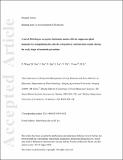A novel Meloidogyne incognita chorismate mutase effector suppresses plant immunity by manipulating the salicylic acid pathway and functions mainly during the early stages of nematode parasitism
Abstract
Meloidogyne incognita is the most economically important plant-parasitic nematode. M. incognita manipulates plant cell development and metabolism by injecting effectors from the esophageal glands into the plant host. Chorismate mutase (CM) is one such effector that may contribute to successful parasitism by M. incognita. In this study, we identified and functionally characterized a novel CM effector, Mi-CM-3, which is more similar to CMs from bacteria than to those previously characterised from other phytoparasitic nematodes. Spatial and temporal expression assays showed that Mi-cm-3 mRNA accumulates specifically in the subventral esophageal glands, and that transcription is up-regulated during the early parasitic stages of the nematode. In planta gene silencing of Mi-cm-3 attenuated nematode parasitism. In addition, Mi-cm-3 could fully restore the full virulence phenotype of the pathogenic bacterium Xanthomonas oryzae pv. oryzae by complementation when it was introduced into a mutant strain carrying a deletion in the CM gene. Transient expression of Mi-CM-3 caused a reduction of SA and PR1 levels in Nicotiana benthamiana in response to oomycete pathogen Phytophthora capsici infection, while confocal observations showed that Mi-CM-3 was localized within the cytoplasm and the nucleus, but not the plastids, of transfected N. benthamiana leaf cells. Constitutive expression of Mi-CM-3 in N. benthamiana plants inhibited root growth and increased susceptibility to M. incognita infection. These results provide direct experimental evidence to show that Mi-CM-3 may play an important role in suppressing plant immunity by regulating the SA pathway during the early parasitic stage of M. incognita so as to promote nematode parasitism.
Citation
Wang , X , Xue , B , Dai , J , Qin , X , Liu , L , Chi , Y , Jones , J T & Li , H 2018 , ' A novel Meloidogyne incognita chorismate mutase effector suppresses plant immunity by manipulating the salicylic acid pathway and functions mainly during the early stages of nematode parasitism ' , Plant Pathology , vol. Early View . https://doi.org/10.1111/ppa.12841
Publication
Plant Pathology
Status
Peer reviewed
ISSN
0032-0862Type
Journal article
Description
This work was supported by the National Natural Science Foundation of China (Grant No. 31371922) and the Fundamental Research Funds for the Central Universities (KYZ201615). John T. Jones is supported by funding from the Rural and Environment Science and Analytical Services Division of the Scottish Government.Collections
Items in the St Andrews Research Repository are protected by copyright, with all rights reserved, unless otherwise indicated.

